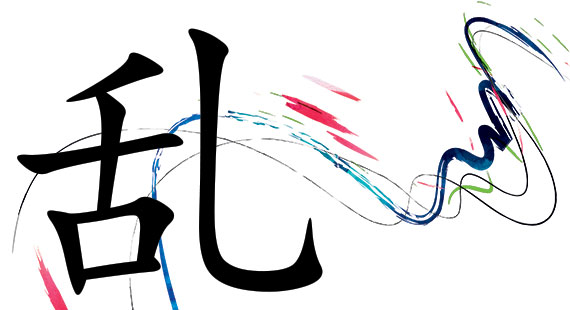
It could be any of the harrowing tourist sites in and out of the country on national holidays. It could be the messy, crowded, rage-filled roads of Beijing. It could be the world inside your head. Imagine a handful of tangled threads and you get the character 乱 (luàn) or "chaos, disorder".
However, the character did not always refer to a state of confusion and turmoil. Its earliest form was discovered among scripts inscribed on bronze vessels and actually meant quite the opposite. On top and bottom of the character were two pictograms representing two hands with a bundle of silk threads hanging on a rack in the middle. Together, it was supposed to be the gesture "to sort out silk threads".
Later, on the right side of the character, a curve radical was added to represent the end result of this activity: neatly separated silk threads. Therefore the original meaning of 乱 was actually to impose order. But entropy took hold as the meaning "disorder" eventually gained the upper hand in the Chinese language. The traditional form of the character, 乱, gave way to its simplified version, 乱.
Throughout Chinese history, dynasties rise and fall. So, 乱 was commonly associated with the instability and disorder of states. Confucius warned: "Do not enter a dangerous state and do not reside in a chaotic one." (危邦不入,乱邦不居.Wēi bāng bú rù, luàn bāng bù jū.) This doesn't just refer to an obvious choice for personal safety, it's a message to the politically-minded to lay low until the situation cools off. Interestingly, an idiom states, 乱世出英雄 (luànshì chū yīngxióng, heroes rise in turbulent times). So, you can take the scholar's advice and mind your business or try your luck at being a superhero. Another quote from Lüshi Chunqiu ( 《吕氏春秋》, literally, Mr. Lü's Annals), a collection of political essays compiled around the third century, states: "To administrate a state without law will lead to chaos; but abiding by the law without reform will cause rebellion. With chaos and rebellion, a state can't possibly be prosperous." (治国无法则乱,守法而弗变则悖,悖乱不可以持国.Zhì guó wú fǎ zé luàn, shǒu fǎ ér fú biàn zé bèi, bèi luàn bù kěyǐ chí guó.)
Today, we use 乱 to describe anything from a messy house to a restless mind. For instance, 家里乱糟糟的,心里也乱糟糟的.(Jiālǐ luànzāozāo de, xīnlǐ yě luànzāozāo de. My home is a mess and my mind is also a mess.) A number of words formed by the character all have similar meanings, such as 紊乱 (wěnluàn, chaos, disorder), 凌乱 (língluàn, in disorder, in confusion), and 乱套 luàntào, to mess things up). A phrase often used to describe a state of disorder is 乱七八糟 (luànqībāzāo, literally, the messy seven and eight). For example, you have: 现在公司里乱七八糟,大家心里也都乱七八糟.(Xiànzài gōngsī lǐ luànqībāzāo, dàjiā xīnlǐ yě dōu luànqībāzāo. The company is in a mess, everyone's mind is a mess.) You might be wondering what seven and eight have to do with disorder. Well, they actually each refer to a chaotic period in Chinese history. First, there are the seven states that rose in rebellion against the emperor in the West Han Dynasty (206 BCE – 25 BC) and second you have the eight princes of the Jin Dynasty (265 – 420) in a 16-year power struggle.


















































